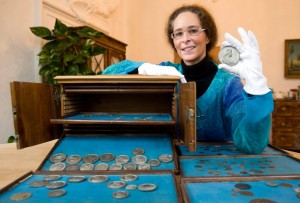 Tanja Höls was doing her janitorial duties in the fourth-floor archive of the State Library of Passau in Bavaria when curiosity drove her to look inside a wooden box she had seen many times but never opened. Within she discovered tray upon tray of coins. There were 172 coins in total, most of them silver, some bronze or brass, ranging in date from Roman antiquity up through the Napoleonic era. Nobody in the library had any idea they were there.
Tanja Höls was doing her janitorial duties in the fourth-floor archive of the State Library of Passau in Bavaria when curiosity drove her to look inside a wooden box she had seen many times but never opened. Within she discovered tray upon tray of coins. There were 172 coins in total, most of them silver, some bronze or brass, ranging in date from Roman antiquity up through the Napoleonic era. Nobody in the library had any idea they were there.
According to Markus Wennerhold, head of the library, the collection likely came into the library’s possession after the 1803 secularization of Germany. The victorious French armies of Napoleon brought constitutional governments based on Revolutionary humanist principles to what was then the highly fragmented and decentralized Holy Roman Empire. Holy Roman Emperors had been handing out vast estates and titles to religious authorities for centuries by then. Even though the Protestant Reformation had stripped some of that temporal power from ecclesiastical rulers, it wasn’t until the early 19th century that the governments of German states systematically secularized religious properties and possessions.
One of those religious properties was the Passau library. It was originally founded in 1612 as the library of the Jesuit College. When Pope Clement XIV suppressed the Jesuit order in 1773, the library passed into the hands of the Passau bishopric and was renamed the Episcopal Academic Library. When secularization hit Bavaria in 1803, the library became state property. Its collection was enormously inflated by the secularization of its neighbors’ holdings. Franciscan, Capuchin, Augustinian, Benedictine, Premonstratensian and Cistercian monasteries in Passau and environs had to give their entire libraries to the new public one.
T
he coins – silver, bronze and brass – were worth millions, [Wennerhold] said. “We looked for similar ones online, and found that some which were the same but in much worse condition had been sold for considerable sums. Then there were coins that we have that are not recorded elsewhere.”
He said the coins had simply been forgotten about. “No-one currently working at the museum knew they were there,” he said.
“They were hidden in 1803 during the secularisation in Germany, when all books and coins were taken from the monasteries and cloisters and put in state hands. The most valuable things were supposed to be taken to Munich, according to the archives, but someone here in Passau decided to keep some of them here and hid some treasures – including these coins.”
They might also have been hidden in the library by their owner rather than having been confiscated. A noble tax evader, perhaps, who wanted to stash them somewhere the government wouldn’t look.
Keep your eye on the library website because next week they have promised to post pictures of each individual coin. They won’t go on display right away, but next year is the library’s 400th anniversary so the coins will be part of a special celebratory exhibit.
As for Mr. Höls, she’s getting promoted to the curatorial department and Wennerhold et al are planning an appropriate reward of a pecuniary nature as well.
I have stumbled across a coin with markings
Victory ( across the top)
10 ( number in the centre)
K.g.l ( actions the bottom )
I wonder if you can shed any light on the history of this coin
Regards